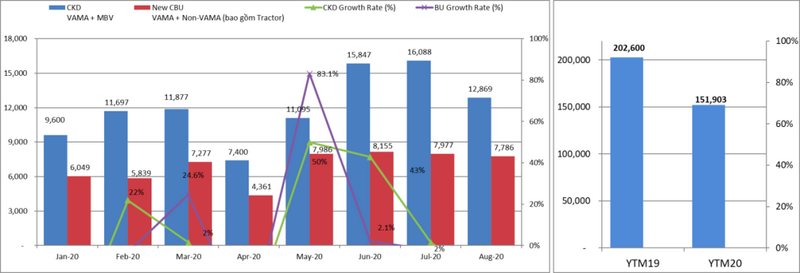Car sales in Vietnam down 14% on “ghost month”
The figure marked the first decline in car sales in four months, following month-on-month increases of 0.3% in July, 26.4% in June and 103% in May.
The number of cars sold in Vietnam decreased by 14% month-on-month and 4% year-on-year to 20,655 units in August, which is also the seventh month on lunar calendar, traditionally called “the ghost month” when locals avoid buying new valuable things on fear of bad luck.
The figure, released monthly by the Vietnam Automobile Manufacturers Association (VAMA), marked the first decline in car sales number in four months, following month-on-month growth of 0.3% in July, 26.4% in June and 62% in May.
| Number of car sales in eight-month period. Source: VAMA. |
The volume included 15,419 passenger cars, down 12% inter-monthly; 4,966 commercial cars, down 20%; and 270 special-purpose vehicles, down 19%.
The sales volume of locally assembled cars in August was 12,869 units, down 20% against the previous month, and that of imported cars was 7,786, down 2%.
Overall, car sales in Vietnam in the January–August period dropped 25% year-on-year to 151,903 units across all segments. Upon breaking down, 109,694 were passenger cars, down 26% year-on-year; 39,787 were commercial vehicles, down 22%; and 2,422 were special-purpose vehicles, down 36%.
Sales of domestically assembled cars reached 96,473 units during the period, down 19% compared to the same period of last year, while imported completely-built-units (CBUs) totaled 55,430 units (-33%).
| Sales of imported cars down 33% year-on-year in January - August period. Source: VAMA. |
Truong Hai Auto Corporation (Thaco) led the market in the first eight months with 49,940 units sold, down 16% year-on-year, followed by TC Motor with 40,987 and Toyota with 34,743.
Automobile is considered a key industry in Vietnam, accounting for approximately 3% of national GDP. However, this industry was severely impacted by the Covid-19 pandemic, with Viet Dragon Securities Company predicting a decline of 15% in sales volume this year compared to its prevision earlier this year.
The government has been adopting a number of supporting policies to boost sales of made-in Vietnam cars in the remaining months of the year, including the decision to slash the registration fee for domestically-produced cars by 50%, effective from June 28, and extend the deadline for payment of excise taxes for domestically-produced/assembled cars until late 2020.
From July 10, 2020, the government’s Decree No.57 amending and supplementing Decree No. 122, allows domestic assembling companies (meeting standards) to be entitled with 0% import tariff on raw materials, components and supplies which cannot be produced locally. The move is set to reduce production costs by 2-5%, so that selling prices can be consequently lowered in order to boost demand.













